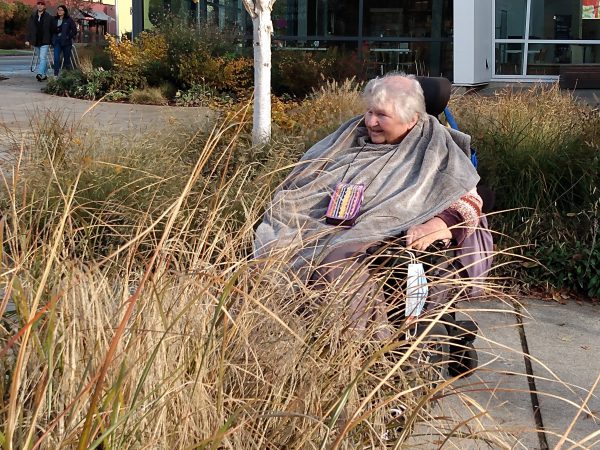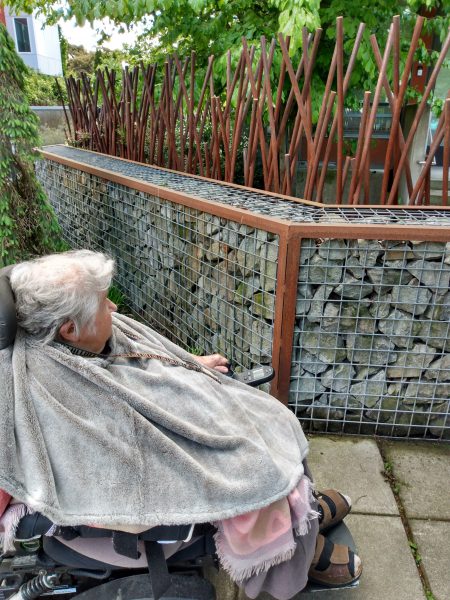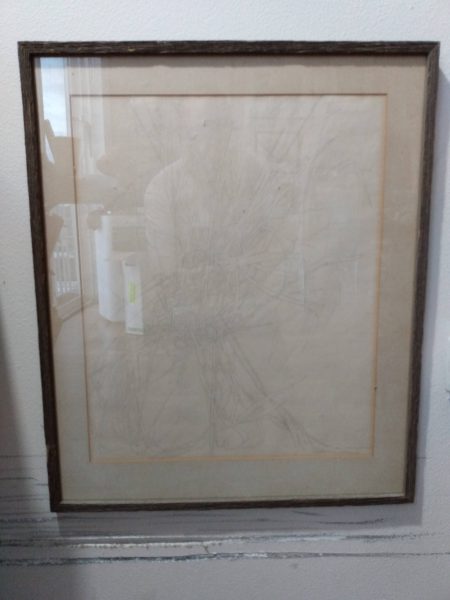[I like to think these news items are a bit like Louis Jenkins’ “small stories”, without his poetic chops.]
Good News, finally! Charlie and I both had COVID and were quarantined together for ten days in my studio apartment of about 400 square feet, which is bad news, but we had been boosted, recovered quickly, which is good news, and committed neither mom-icide or son-icide, which is very good news. WHEW!
—————————————-
Good news! Maira Kalman’s new book, Women Holding Things, is my current favorite and a wonder. It is mostly pictures she painted of, yes, women holding things, which cumulate to an affirmation of women and to her wise, hopeful advice: ”It is hard work to hold everything and it never ends. You may be exhausted from holding things and disheartened…. But then there is the next moment and the next day… hold on.” I love Maira Kalman, and her memoir, Principles of Uncertainty may be the best place to start, if you want more.
I wish I could give Women Holding Things to every strong woman that I know, and, though I would start with my two marvelous nieces [Big shout out to Sarah and Susan], I can’t think of any women I know well who are not strong.

Action shot: Thinking about biking roads with ditch grasses, fields, and meadowlarks.
But if “holding something” were key, I remember maybe most Sister Margery Smith, Irish person and St. Kate’s archivist extraordinaire, telling me, on my way out of her office to teach a five hour, Friday night class, that she thought, for all my name and tongue, that I might not be Irish. Well, that stopped me in my tracks. “Why not?” I asked. Pause. “You apparently don’t know how to hold a grudge,” she said, somberly, “but I would be happy to teach you.” I love and miss Sister Margery. She clearly belongs in the book.
———————————————–
Good news! Old dogs CAN learn new tricks! I read a NYT report of a group of specialists, aging as I write, asking if oldies can still learn. My fun was being introduced to “cognitive neuroplasticity”, which I think means that the oldie’s lifetime of memories, experience, and learning are lurking in the brain, ready to contribute to to the oldie’s thinking, and, when traveling changeable brain-paths, may result in different, unexpected [but probably exciting] conclusions. Though I can’t find the words, I am sure I read this and know it anyhow, because, like other former faculty of Metro State or St. Kate’s Weekend College, I know that “olders” or “pre-oldies” make the most interesting, and the best ever, students, for just these reasons.
(These are the words I did find. “[E]xperts in geriatrics say that people in their 80s who are active, engaged and have a sense of purpose can remain productive and healthy — and that wisdom and experience are important factors to consider…. [In people who are active], experts say, the brain continues to evolve and some brain functions can even improve — a phenomenon experts call the ‘neuroplasticity of aging.’… ‘Age,’ he said, ‘is not something to consider on its own.’” NYT, 11/19/2022)

Action Shot: See ditch grasses in the rod-iron fence, sculpted by a prairie soul.
I love the affirmation, FINALLY, that seeing things “differently” is an oldie plus. Take that, favorite brother-in-law Ralph. He and I were watching the boats in Tenants Harbor and, for some [?] reason, I mentioned that it was a good thing that the Irish were in Iceland before the Vikings, so that Brendan and his buds could teach the marauding Vikings how to sail the longer distances required to get them out of Ireland. My b-i-l stared at me and asked, somewhat snarkily, as I recall, “Did you read that in a book or did you just make it up?” “Some of both.” I said, winningly. I mean, isn’t putting found facts “in context” what understanding life, then and now, is all about?
(Just to get you started thinking differently about our “explorer genes”, I suggest Tim Severin’s The Brendan Voyage, and more “subtly” Yrsa Sigurdardottir’s mystery, “Last Rituals”.)
But before you give facts a context, you have to find them, which brings to mind ever useful librarians, who, as society’s fact finders, working together with fact users, are contemporary “shape-shifters”, who apply one or another theory or narrative or frame to the facts found. I love the thought of the librarian’s power to find facts and frames to amend the argument, especially in this day of “cancel culture” on the left, “ban books” on the right, and too much mis-information generally. Let’s hear it – in shushed tones – for librarians Yay, librarians!
[For more about warrior librarians, read Stephen Marche’s article in The Guardian about the warrior librarians of Ukraine and Joshua Hammar’s book, The Badass Librarians of Timbuktu.]

Action shot: Ignore the shadows and glare to almost see the penciled ditch grasses. [Diana Crane’s watercolor-ed ditch grasses had pink and cost too much.]
Christmas in Seattle, 2022 To Santa, Re: Very Good Mother’s Christmas List, 1st edition
All I want for Christmas is for you or an elf to do the following: 1. Sort, toss and/or file the piles of mail. 2. Sort, store, or arrange table tops [especially, but not only, at head of sofa]. 3. Arrange, artfully, scarves on the scarf rack. 4. Arrange or tidy, then dust or vacuum desk and duck-on-table tops. 5. Hang, or place differently, 4 pictures. If there is any confusion, I can help.
From your very good mother
So far, three weeks later, disguising himself as Charlie in his awful athleisure pants, Santa has addressed the duck-on-table top, or 1/2 of item 4. I am hopeful.
————————————————-
Very Good News. I love this thought [from Louis Jenkins’ poem, “Freeze”] :
…“Everything dies, we understand. But the mind of the observer, which cannot imagine not imagining, goes on.”…
I will keep on imagining so that I can keep on cheering up the people I meet, which is my long and still held purpose, no matter how lame I and my jokes [I prefer “small stories”] get. If you are reading this, and even if you’re not one of the enlightened twelve, that includes you. So with the longer life that having purpose supports, I will post again.
Here’s to a hopeful year of thinking and doing and laughing so hard you cant talk, of hating hate and figuring out some way you can make the world more livable, etc., etc., etc. I am about to write to the Seattle Times Book Editor about my current favorite mystery series or sites. [Well, she asked for suggestions.] Happy New Year to all, from Seattle, where it is 47 degrees and raining.

Thanks, Colleen. Tough winter here in Minnesota with not just heavy snow, but conditions for lots of ice. I have my books (with some new entries from your blog), my photo projects and lots of family and friends to keep busy and interested. My forced hyacinths are blooming and their heavy scent is wonderful to breath first thing every morning when I come down. I’m still holding things.
Bev
It is so good to hear how things are going.
Life in MN has been cold and gray, but otherwise not bad.
Here’s wishing you a year full of good news!
Colleen, I don’t respond, nor indeed write as often as I’d like to (I’m trying to leave the word “should” out of my vocabulary, and certainly two words “should have”…). That’s no excuse for not writing. I always love reading your blog, you fill me with joy and optimism. It’s been year of recovery for me (two broken femurs, hence no trip to Maine with the crew last year) but I’m walking almost like days of old and have been blessed with family, friends and excellent medical care — and LOVE as I’ve taken this journey. I now look forward to seeing my family in Europe, I’ve had one trial run for flying to Bloomington, IN where my son and daughter-in-law are spending a sabbatical from their academic jobs in Budapest. My warmest greetings to you, may you continue to thrive in 2023 and continue to share your indomitable spirit with us, and your love of books.
Hi Asta, What a wonderful hello. Word of advice regarding legs that sometimes do and sometimes don’t behave as they used to: Stand, even walk, when you can, and give thanks, sit, with great authority and relief when you can’t; and rejoice in the newfound time to read [given your upcoming trip, “The American Library in Paris” by Janet Skeslian Charles might be an apt choice], think about things, and, to clear the room, as needed, say, sweetly, “I can help you with that,” which strikes dread in the heart of Charlie every time. Here’s to a new year filled with adventures, family, fun, and hope that North Carolina politics and weather are not entirely crazy. Colleen
Hi Leah, And I love your pictures. Who knew that urban high-rises could highlight the sky’s beauty and variety so remarkably? HNY, Colleen
I love that you comment and that your comments always let me know you read and “got” my reason for writing what I did. I have new appreciation for the personal history an emigree leaves behind and the importance of friendly ties that bind. Here’s to a HAPPY and HOPEFUL NEW YEAR filled with imagining, Colleen
You ‘ve written so many thought-provoking things here, but I will comment only on one. Kalman’s Women Carrying Things reminded me of Tim O’Brien’s The Things They Carried (1987) about the objects and the feelings soldiers carried in the Vietnam War. Charles Baxter, in Wonderlands: A Life in Literature (Graywolf, 2022) observes the soldier becomes what he carries. Let’s try to be careful of the burdens we take on.
Love and gratitude, Marcia
My mistake: Women Holding Things. (We often carry what we hold.)
Colleen,
Doing a jigsaw puzzle while listening to music doesn’t seem to really meet the demands, or gain the benefits of “contextual enrichment” for my brain. I need to devise some “random practice”. In the meantime, thanks again for sending this article. Love from the land of mush, alternate snow, rain, ice, and more snow.
Marcia